Related Research Articles

The Byrds were an American rock band formed in Los Angeles, California, in 1964. The band underwent multiple lineup changes throughout its existence, with frontman Roger McGuinn remaining the sole consistent member. Although their time as one of the most popular groups in the world only lasted for a short period in the mid-1960s, the Byrds are considered by critics to be among the most influential rock acts of their era. Their signature blend of clear harmony singing and McGuinn's jangly 12-string Rickenbacker guitar was "absorbed into the vocabulary of rock" and has continued to be influential.
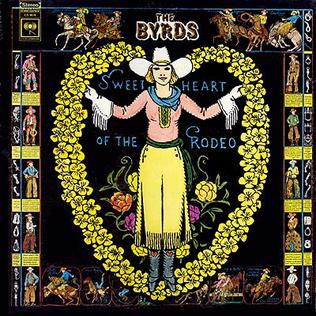
Sweetheart of the Rodeo is the sixth album by the American rock band the Byrds and was released in August 1968 on Columbia Records. Recorded with the addition of country rock pioneer Gram Parsons, it became the first album widely recognized as country rock as well as a seminal progressive country album, and represented a stylistic move away from the psychedelic rock of the band's previous LP, The Notorious Byrd Brothers. The Byrds had occasionally experimented with country music on their four previous albums, but Sweetheart of the Rodeo represented their fullest immersion into the genre up to that point in time. The album was responsible for bringing Parsons, who had joined the Byrds in February 1968 prior to the start of recording, to the attention of a mainstream rock audience for the first time. Thus, the album is an important chapter in Parsons' crusade to make country music fashionable for a young audience.

"Mr. Tambourine Man" is a song written by Bob Dylan, released as the first track of the acoustic side of his March 1965 album Bringing It All Back Home. The song's popularity led to Dylan recording it live many times, and it has been included in multiple compilation albums. It has been translated into other languages and has been used or referenced in television shows, films, and books.
"My Back Pages" is a song written by Bob Dylan and included on his 1964 album Another Side of Bob Dylan. It is stylistically similar to his earlier folk protest songs and features Dylan's voice with an acoustic guitar accompaniment. However, its lyrics—in particular the refrain "Ah, but I was so much older then/I'm younger than that now"—have been interpreted as a rejection of Dylan's earlier personal and political idealism, illustrating his growing disillusionment with the 1960s folk protest movement with which he was associated, and his desire to move in a new direction. Although Dylan wrote the song in 1964, he did not perform it live until 1988. However, during his 1978 tour, his band played a brief instrumental version of it as Dylan took the stage.
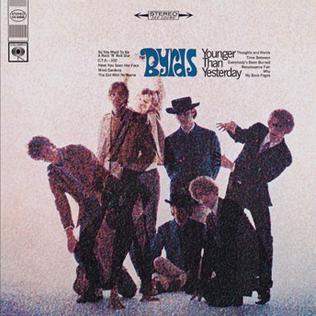
Younger Than Yesterday is the fourth studio album by the American rock band the Byrds and was released on February 6, 1967, on Columbia Records. It saw the band continuing to integrate elements of psychedelia and jazz into their music, a process they had begun on their previous album, Fifth Dimension. In addition, the album captured the band and record producer Gary Usher experimenting with new musical textures, including brass instruments, reverse tape effects and an electronic oscillator.
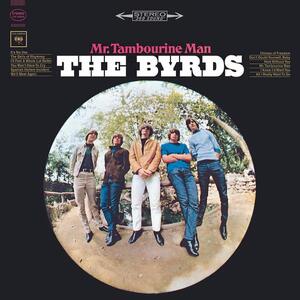
Mr. Tambourine Man is the debut studio album by the American rock band the Byrds and was released on June 21, 1965, by Columbia Records. The album is characterized by the Byrds' signature sound of Jim McGuinn's 12-string Rickenbacker guitar and the band's complex harmony singing. The material on the album mostly consists of cover versions of folk songs, primarily composed by Bob Dylan, and originals written or co-written by singer Gene Clark. Along with the Dylan-penned single of the same name, Mr. Tambourine Man established the band as an internationally successful act and is widely regarded by critics as representing the first effective American challenge to the chart dominance of the Beatles and other British Invasion bands during the mid-1960s.
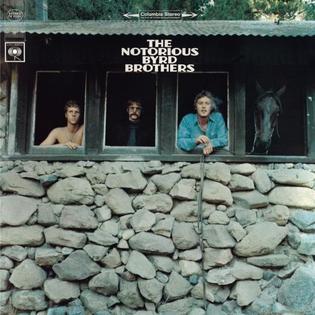
The Notorious Byrd Brothers is the fifth album by the American rock band the Byrds, and was released in January 1968, on Columbia Records. The album represents the pinnacle of the Byrds' late-'60s musical experimentation, with the band blending together elements of psychedelia, folk rock, country, electronic music, baroque pop, and jazz. With producer Gary Usher, they made extensive use of a number of studio effects and production techniques, including phasing, flanging, and spatial panning. The Byrds also introduced the sound of the pedal steel guitar and the Moog modular synthesizer into their music, making it one of the first LP releases on which the Moog appears.

Bob Dylan's Greatest Hits Vol. II, also known as More Bob Dylan Greatest Hits, is the second compilation album by American singer-songwriter Bob Dylan, released on November 17, 1971 by Columbia Records. With Dylan not expected to release any new material for an extended period of time, CBS Records president Clive Davis proposed issuing a double LP compilation of older material. Dylan agreed, compiling it himself and suggesting that the package include a full side of unreleased tracks from his archives. After submitting a set of excerpts from The Basement Tapes that Davis found unsatisfactory, Dylan returned to the studio in September 1971 to recut several Basement songs, with Happy Traum providing backup.

Turn! Turn! Turn! is the second studio album by the American rock band the Byrds, released on December 6, 1965, by Columbia Records. Like its predecessor, Mr. Tambourine Man, the album epitomized the folk rock genre and continued the band's successful mix of vocal harmony and jangly twelve-string Rickenbacker guitar. The album's lead single and title track, "Turn! Turn! Turn!", which was adapted by Pete Seeger from text in the Book of Ecclesiastes, had previously been arranged in a chamber-folk style by the Byrd's lead guitarist Jim McGuinn for folk singer Judy Collins' third album, but the arrangement he used for the Byrds' recording of the song utilizes the same folk-rock style as the band's previous hit singles.

Dr. Byrds & Mr. Hyde is the seventh studio album by the American rock band the Byrds and was released in March 1969 on Columbia Records. The album was produced by Bob Johnston and saw the band juxtaposing country rock material with psychedelic rock, giving the album a stylistic split-personality that was alluded to in its title. It was the first album to feature the new band line-up of Clarence White (guitar), Gene Parsons (drums), John York (bass), and founding member Roger McGuinn (guitar). Dr. Byrds & Mr. Hyde is unique within the band's discography for being the only album on which McGuinn sings the lead vocal on every track.

Farther Along is the eleventh studio album by the American rock band the Byrds and was released in November 1971 on Columbia Records. For the most part, the album was recorded and produced by the Byrds themselves in London, England, over the course of five work-intensive days in July 1971. It was quickly released as a reaction to the commercial failure of the Byrds' previous album, Byrdmaniax, and as an attempt to stem the criticism that album was receiving in the music press.

The Best of The Byrds: Greatest Hits, Volume II is the third greatest hits album by the American rock band the Byrds, but only the second to be released in the United States, since the earlier The Byrds' Greatest Hits Volume II had only been issued in the UK. The album was released in the U.S. by Columbia Records on November 10, 1972 in lieu of any new Byrds' product during that year. It spent a total of thirteen weeks on the Billboard Top LPs & Tapes chart and peaked at number 114.

The Byrds is a four-CD box set by the American rock band the Byrds. It features music that had previously been released between the mid-1960s and early 1970s, along with a number of previously unreleased tracks and some new recordings from 1990. The box set was issued on October 19, 1990, by Columbia/Legacy and reached number 151 on the Billboard albums chart.

The Original Singles: 1967–1969, Volume 2 is a compilation album by American rock band the Byrds.
"You Ain't Goin' Nowhere" is a song written by American musician Bob Dylan in 1967 in Woodstock, New York, during the self-imposed exile from public appearances that followed his July 29, 1966 motorcycle accident. A recording of Dylan performing the song in September 1971 was released on the Bob Dylan's Greatest Hits Vol. II album in November of that year, marking the first official release of the song by its author. Earlier 1967 recordings of the song, performed by Dylan and the Band, were issued on the 1975 album The Basement Tapes and the 2014 album The Bootleg Series Vol. 11: The Basement Tapes Complete.
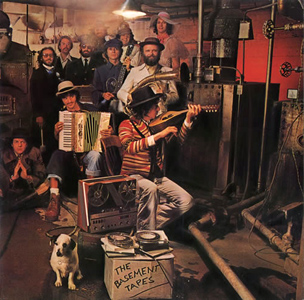
The Basement Tapes is the sixteenth album by the American singer-songwriter Bob Dylan and his second with the Band. It was released on June 26, 1975, by Columbia Records. Two-thirds of the album's 24 tracks feature Dylan on lead vocals backed by the Band, and were recorded in 1967, eight years before the album's release, in the lapse between the release of Blonde on Blonde and the subsequent recording and release of John Wesley Harding, during sessions that began at Dylan's house in Woodstock, New York, then moved to the basement of Big Pink. While most of these had appeared on bootleg albums, The Basement Tapes marked their first official release. The remaining eight songs, all previously unavailable, feature the Band without Dylan and were recorded between 1967 and 1975.
"The Bells of Rhymney" is a song by the folk singer Pete Seeger, which consists of Seeger's own music accompanying words written by the Welsh poet Idris Davies. Seeger first released a recording of the song on a live album in 1958, but it is the American folk rock band the Byrds' 1965 recording that is the best known version of the song.

Preflyte is a compilation album by the American folk rock band the Byrds and was released in July 1969 on Together Records. The album is a collection of demos recorded by the Byrds at World Pacific Studios in Los Angeles during late 1964, before the band had signed to Columbia Records and become famous. It includes early demo versions of the songs "Here Without You", "You Won't Have to Cry", "I Knew I'd Want You", and "Mr. Tambourine Man", all of which appeared in re-recorded form on the band's 1965 debut album.
Kevin Daniel Kelley was an American drummer, best known for his work with the rock bands the Byrds and the Rising Sons. Kelley also played drums for Fever Tree, although it is unknown whether he was an official member of the group or not. Kelley is the cousin of country rock pioneer and ex-member of the Byrds and the Flying Burrito Brothers, Chris Hillman.
References
- 1 2 3 4 5 6 7 8 Margotin, Philippe; Guesdon, Jean-Michel (2015). Bob Dylan: All the Songs. Black Dog & Leventhal. p. 268. ISBN 9781579129859.
- 1 2 3 4 5 Trager, Oliver (2004). Keys to the Rain. Billboard Books. pp. 459–460. ISBN 0823079740.
- 1 2 3 4 5 Gill, Andy (1998). Don't Think Twice It's Alright. Thunder's Mouth Press. p. 122. ISBN 1560251859.
- 1 2 3 4 5 6 7 Heylin, Clinton (2009). Revolution in the Air. Chicago Review Press. pp. 354–355. ISBN 9781556528439.
- 1 2 3 4 Shelton, Robert (1997). No Direction Home. Da Capo Press. pp. 384–385. ISBN 0306807823.
- 1 2 3 4 5 6 Heylin, Clinton (1995). Bob Dylan: The Recording Sessions 1960–1994 . St. Martin's Griffin. pp. 55, 66. ISBN 0312150679.
- 1 2 3 4 5 6 7 Hjort, Christopher (2008). So You Want to Be a Rock 'n' Roll Star. Jawbone. pp. 156, 164–165, 188. ISBN 9781906002152.
- 1 2 3 4 Rogan, Johnny (1997). The Byrds: Timeless Flight Revisited. Rogan House. p. 272. ISBN 095295401X.
- ↑ Sheffield, Rob (2004). Brackett, Nathan; Hoard, Christian (eds.). The New Rolling Stone Album Guide . Fireside. p. 126. ISBN 0743201698.
- ↑ Clark, Rick (1997). Erlewine, Michael (ed.). All Music Guide to Country: The Experts' Guide to the Best Recordings in Country Music. Hal Leonard. p. 67. ISBN 9780879304751.
- ↑ Egan, Sean (2006). Egan, Sean (ed.). 100 Albums That Changed Music. Magpie Books. p. 137. ISBN 9781845294014.
- 1 2 Chadbourne, Eugene. "Steel Guitar". Allmusic . Retrieved 2017-03-01.